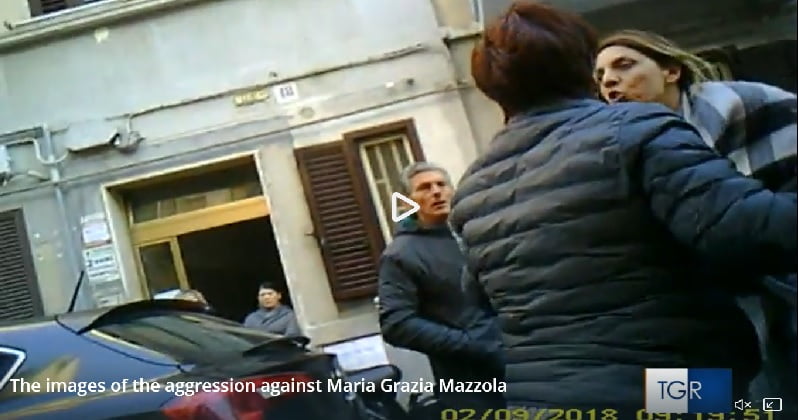The public prosecutor of Bari’s Direzione Distrettuale Antimafia (DDA) requested on 18 February a three-year prison sentence for Monica Laera, the wife of a boss affiliated to Bari’s Strisciuglio mafia clan, who attacked TG1’s special correspondent and investigative journalist, Maria Grazia Mazzola, a year ago.
At the time, Mazzola was carrying out a 50-minute investigation on the growing “militarisation” of the Libertà district in Bari by clans that recruited children, and on Don Francesco Prete’s attempts to wrest them away from the mafia’s grasp.
Equipped with cameramen and hidden cameras, Mazzola went to Via Petrelli, the street where the Caldarola family resides, to gather news about the indictment of Laera’s son, Ivan Caldarola, for sexual violence against a young girl. When Mazzola approached Laera to ask her a question, Laera railed against the journalist, attacked her physically and threatened her.
The court confirmed the charges of injury, mafia-related aggravating circumstances and the death threats against the journalist.
When reconstructing the events that took place three years ago, the magistrate highlighted the characteristics of what is known as the “mafia method” of intimidation. These included the gratuitous nature of the aggression, the shamelessness of Laera’s behaviour and the arrogance of the final threat to the journalist that implies control of the territory: “Don’t come here anymore or I’ll kill you”.
https://www.facebook.com/mariagrazia.mazzola.10/posts/468330310869575
The medico-legal report relative to the incident further described how Mazzola suffered micro-fractures and permanent damage to her face as a result of Laera’s punch.
Similar incidents of physical attacks and threats to journalists by members of known mafia families are common in Italy. In July 2017, journalist Nello Trocchia was reporting on organised crime in Vieste, when he was dragged for some metres, pushed to the ground and kicked.
On 7 November 2017, journalist Daniele Piervincenzi and filmmaker Edoardo Anselmi were attacked by Roberto Spada, a member of the notorious Spada family, well-known to Italy’s law enforcement and the media for various judicial investigations.
Piervincenzi was reporting on the outcome of local elections in Ostia, a coastal city close to Rome. When the journalist questioned Spada’s ties to a far right movement, Roberto Spada suddenly lunged and headbutted the reporter, breaking his nose, before pulling out a baton, hitting him and chasing him down the street.
Italy’s highest court (Corte di Cassazione) confirmed Spada’s pre-trial detention in prison for the attack on the journalist. The charges against Spada were indisputable, given that his actions were caught on camera, but the court also considered how his actions were characterised by the so-called “aggravating circumstance of the mafia method”.
This “method” employs three elements: intimidation using association (of an existing or presumably existing mafia association), the conditions of subjugation and the silence of individuals who are outside this association. If the crime is committed using the “mafia method”, there is an increase in penalty.

A screenshot of the video where Monica Laera punched journalist Maria Grazia Mazzola in the jaw. Photo: TG1
Maria Grazia Mazzola has constantly fought for the safety of journalists. In October 2020, she delivered a 20-page written memoir to the Parliamentary Committee for Threatened Journalists of the National Anti-Mafia Commission. She has also covered the assassination of journalist Daphne Caruana Galizia in Malta in October 2017.
She was joined by the Lazzaro Pappagallo, Secretary of the Roman Press Association. During the hearing, she recounted the death threats and the physical assault with injuries caused by Laera as well as the threats via social media in relation to her investigation into the murders of the Slovak journalist Jan Kuciak and his partner Martina Kusnirova, and the murder of Daphne Caruana Galizia.
Another question raised before the parliamentary committee was the effectiveness of information on large scale organised crime. “Citizens have the right to know the truth about mafias: information is still marginal,” Mazzola and Pappagallo stressed, “like those journalists who try to guarantee it”.
The judgement against Laera is scheduled to be delivered on 15 April.













